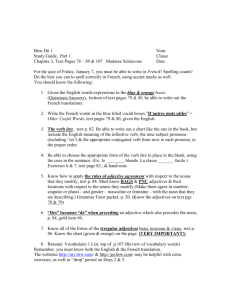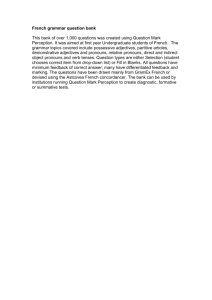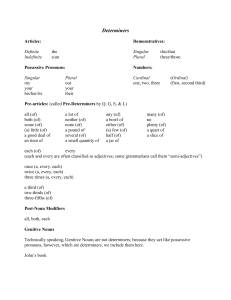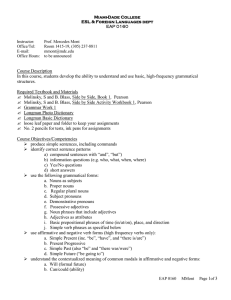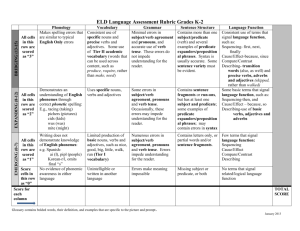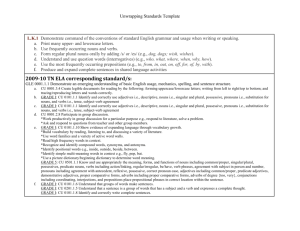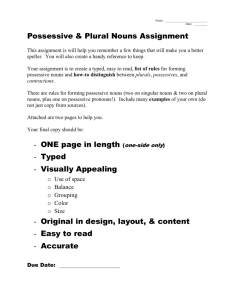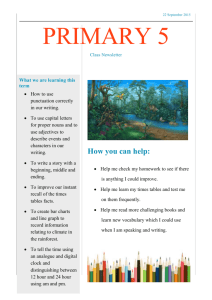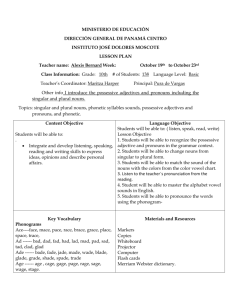16 Mar 09 - Pegasus @ UCF
advertisement
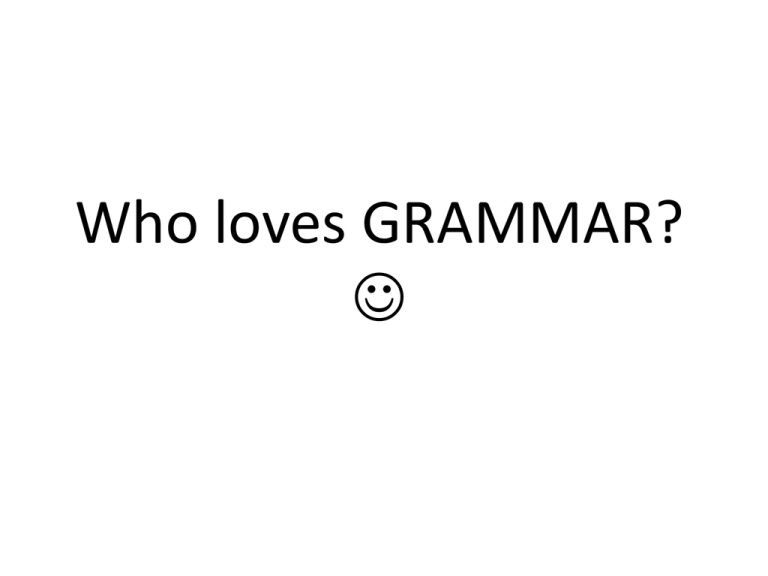
Who loves GRAMMAR? So what exactly is GRAMMAR? There are 2 types of grammar. What are they? •Prescriptive •Descriptive Prescriptive concerned with RULES •Don’t split an infinitive. •Don’t end a sentence in a preposition. •Don’t use ain't •Don’t use seen as the past tense of see (as in I seen him at the party last night). •Don't start a sentence with a conjunction. •Don't use a plural pronoun to refer back to a singular noun. •Use whom, not who, as the object of a verb or preposition. •Adverb use (especially bad and badly) •Use the proper direct object connector. EX: The girl THAT failed the test. (Should be The girl WHO failed the test.) Descriptive DESCRIBES how the language is actually used Applies to everyday use and scholarly work in language The Parts of Speech What are they again? •Nouns •Verbs •Adjectives •Adverbs •Prepositions •Articles •Conjunctions Nouns common and proper nouns – What are the rules for capitalizing a noun in English? count and noncount nouns – When do I use much/many, few/little? Why can’t I say much persons (In Spanish it’s "muchas personas")? Why do I say many cars but much/a lot of traffic (not many traffics)? singular and plural nouns – Do all languages have plural suffixes (like our -s)? In English, what is the regular plural? Irregular? What about the pronunciation? Pronouns subject pronouns (he) and object pronouns (him) possessive adjectives (her + noun) - In Spanish the possessive "su" is used for our his/her/your, which can confuse ELLs and lead to funny utterances like, "She brushed your teeth.“ possessive adjectives (her) vs. possessive pronouns (hers) indefinite pronouns (everyone/body/thing)– are they singular or plural? demonstratives -- this/that/these/those Verbs verb tenses Simple Progressive Perfect Perfect Progressive Present I love I am loving I have loved I have been loving Past I loved I was loving I had loved I had been loving Future I will love I will be loving I will have loved I will have been loving Important points to remember: •FUTURE tense ALWAYS has “will.” •PROGRESSIVE ALWAYS has a form of “to be.” •PERFECT tense ALWAYS has a form of “have” and the participle. What is a phrasal verb? It is a verb + a particle (either a preposition or adverb). These are very difficult for ELLs. EX: take off stand out look into DON’T BE CONFUSED… Just because a PARTICLE is near a VERB does not mean that it is a phrasal verb. For instance, He stood outside to wait for the bus. NOT a phrasal verb Go to the website below to get ideas for Assignment 9: www.eslcafe.com/pv What is a MODAL? Modals are used to express the subtle meanings of verbs. •Can •Could •Will •Would •Shall •Should •May •Might •Must •Ought to •Had better Adjectives comparative and superlative adjectives (-er/-est vs. more/most - ; as -- as) - Why can’t I say "more happy?" Why do I have to say "happier" but I can’t say "interestinger"? Here’s the rule… 1 Syllable: Taller 2 Syllables ending in “-y”: Happier 2 Syllables (no “-y”): more modern 3 Syllables: more beautiful –ing and –ed verbal adjectives – What’s the difference in meaning between interesting- interested, boring - bored, surprising- surprised, tiring- tired, etc.? Adverbs ADVERBS are the –ly words, but they also answer questions like “how” (i.e. really and very) and “when” (i.e. yesterday and now) Provide more information about actions, states, or events. Prepositions and Articles Prepositions and articles are two of the hardest things for even advanced ELLs. What is NO ARTICLE? When you want to talk about a CATEGORY or group in general: Cats can be great pets. As opposed to using the article to denote SPECIFIC cats: The cats up for adoption are cute. ALSO Use NO ARTICLE before abstract nouns, such as feelings or ideas: Patience is a virtue. Types of Errors Global errors – errors that affect communication. These are the BIG errors. Ex: “I am anger.” (I am hungry) Local errors – errors that do NOT affect meaning. Ex: “I have hungry.” (I am hungry) Overt errors – obvious errors. Context is not important to detect the error. A: How are you? B: I fine. Covert errors–only noticeable IN CONTEXT. A: How are you? B: Today is sunny. Ways to Correct Errors Recast – implicit; reformulates the utterance in an unobtrusive way. S: I lost my road. T: Oh, yeah, I see, you lost your way. Clarification Request – elicitation of a reformulation or repetition from a student (asking a student to repeat or clarify). S: I didn’t went yesterday. T: I’m sorry? What’s that? Metalinguistic feedback – providing comments, information or questions related to the grammar of a student’s utterance. S: I am here since January. T: Well, ok, but remember we talked about the present perfect tense? Ways to Correct Errors, Cont. Elicitation – prompting the learner to self correct. S [ to another student]: What means this word? T: Uh, Luis, how do we say that in English? S: Ah, what does this word mean? Explicit correction – clearly indicating to the student that the form is incorrect and the providing the correct form. S: When I have 12 years old… T: No, not have. You mean, “when I was 12 years old.” Repetition – repeating the ill-formed part of a student’s utterance, usually with a change of intonation. S: When I have 12 years old… T: When I have 12 years old?
